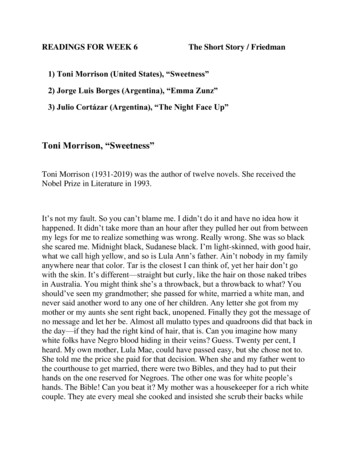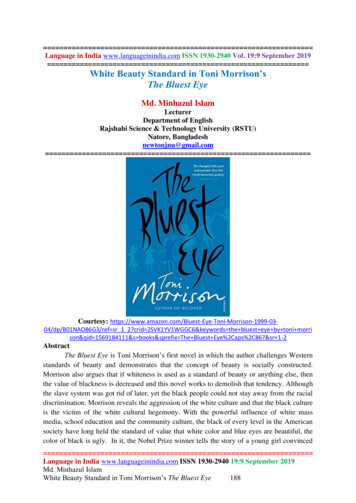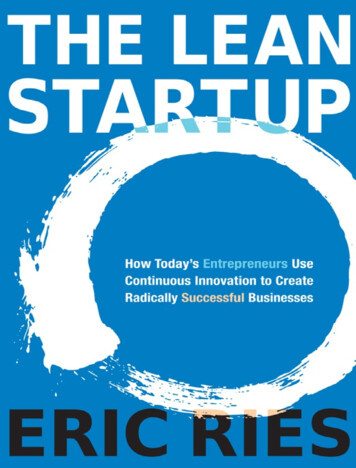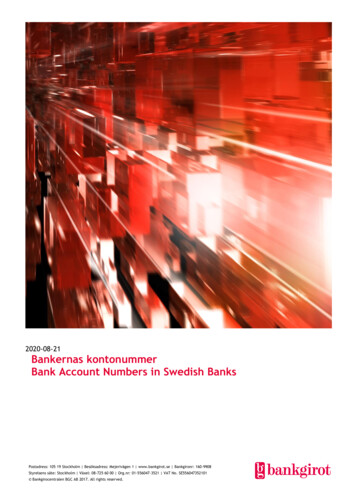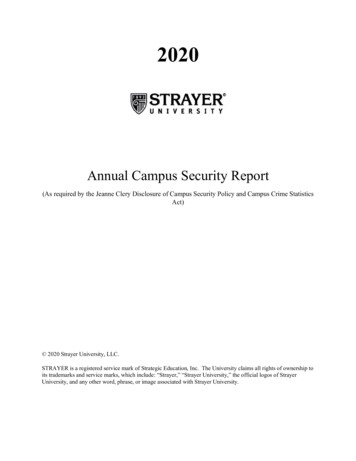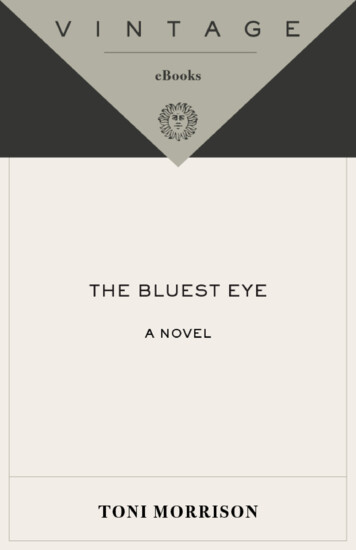
Transcription
acclaim forToni Morrison“[Toni Morrison] may be the last classic American writer,squarely in the tradition of Poe, Melville, Twain and Faulkner.”—Newsweek“In the first ranks of our living novelists.”—St. Louis Post-Dispatch“Toni Morrison is not just an important contemporary novelistbut a major figure in our national literature.”—The New York Review of Books“She is the best writer in America.”—John Leonard, National Public Radio“[Toni Morrison] has moved from strength to strength untilshe has reached the distinction of being beyond comparison.”—Entertainment Weekly“Morrison is one of the most exciting living American writers.”—The Kansas City Star
The Bluest Eye“Toni Morrison has made herself into the D. H. Lawrence ofthe black psyche, transforming individuals into forces, idiosyncrasy into inevitability.”—New York“Morrison is perhaps the finest novelist of our time.” —Vogue“Toni Morrison is one of the finest writers in America today.”—Louisville Courier-Journal
Toni MorrisonThe Bluest EyeToni Morrison is the Robert F. Goheen Professor of Humanities, Emeritus at Princeton University. She has received theNational Book Critics Circle Award and the Pulitzer Prize. In1993 she was awarded the Nobel Prize in Literature. She livesin Rockland County, New York, and Princeton, New Jersey.
also by toni morrisonfictionLoveParadiseJazzBelovedTar BabySong of SolomonSulanonfictionThe Dancing MindPlaying in the Dark:Whiteness and the Literary Imagination
L THEBLUESTEYE La novelToni Morrisonv i n ta g e i n t e r nat i o na lVintage BooksA Division of Random House, Inc.New York
F I R S T V I N TA G E I N T E R N AT I O N A L E D I T I O N , M AY 2 0 0 7Copyright 1970, copyright renewed 1998 by Toni MorrisonForeword 1993, 2007 by Toni MorrisonAll rights reserved. Published in the United States by Vintage Books,a division of Random House, Inc., New York, and in Canada by RandomHouse of Canada Limited, Toronto. Originally published in hardcover inthe United States by Holt, Rinehart and Winston, Inc, in 1970, andsubsequently published in slightly different form in hardcoverby Alfred A. Knopf, a division of Random House, Inc., in 1993.Vintage is a registered trademark and Vintage International and colophonare trademarks of Random House, Inc.Portions of the foreword were previously published as theafterword to the 1993 Knopf edition.The Library of Congress has cataloged the Knopf edition as follows:Morrison, Toni.The bluest eye / by Toni Morrison. —1st ed.p. cm.1. Afro-Americans—Ohio—Fiction. 2. Girls—Ohio—Fiction. I. TitlePS3563.08749855 1993813.54—dc2093-43124eISBN: 978- 0-307-38658-8w w w. v i n t a g e b o o k s . c o mv1.0
To the two who gave me lifeand the one who made me free
ForewordThere can’t be anyone, I am sure, who doesn’t know what itfeels like to be disliked, even rejected, momentarily or for sustained periods of time. Perhaps the feeling is merely indifference, mild annoyance, but it may also be hurt. It may even bethat some of us know what it is like to be actually hated—hated for things we have no control over and cannot change.When this happens, it is some consolation to know that thedislike or hatred is unjustified—that you don’t deserve it. Andif you have the emotional strength and/or support from familyand friends, the damage is reduced or erased. We think of it asthe stress (minor or disabling) that is part of life as a human.When I began writing The Bluest Eye, I was interestedin something else. Not resistance to the contempt of others, ways to deflect it, but the far more tragic and disablingconsequences of accepting rejection as legitimate, as selfevident. I knew that some victims of powerful self-loathingturn out to be dangerous, violent, reproducing the enemywho has humiliated them over and over. Others surrender
Forewordtheir identity; melt into a structure that delivers the strongpersona they lack. Most others, however, grow beyond it.But there are some who collapse, silently, anonymously, withno voice to express or acknowledge it. They are invisible. Thedeath of self-esteem can occur quickly, easily in children,before their ego has “legs,” so to speak. Couple the vulnerability of youth with indifferent parents, dismissive adults, anda world, which, in its language, laws, and images, re-enforcesdespair, and the journey to destruction is sealed.The project, then, for this, my first book, was to enter thelife of the one least likely to withstand such damaging forcesbecause of youth, gender, and race. Begun as a bleak narrative of psychological murder, the main character could notstand alone since her passivity made her a narrative void. SoI invented friends, classmates, who understood, even sympathized, with her plight, but had the benefit of supportive parents and a feistiness all their own. Yet they were helpless aswell. They could not save their friend from the world. Shebroke.The origin of the novel lay in a conversation I had with achildhood friend. We had just started elementary school. Shesaid she wanted blue eyes. I looked around to picture herwith them and was violently repelled by what I imagined shewould look like if she had her wish. The sorrow in her voiceseemed to call for sympathy, and I faked it for her, but,astonished by the desecration she proposed, I “got mad” ather instead.Until that moment I had seen the pretty, the lovely, thenice, the ugly, and although I had certainly used the word“beautiful,” I had never experienced its shock—the force ofwhich was equaled by the knowledge that no one recognizedit, not even, or especially, the one who possessed it.
xiIt must have been more than the face I was examining:the silence of the street in the early afternoon, the light, theatmo-sphere of confession. In any case it was the first time Iknew beautiful. Had imagined it for myself. Beauty was notsimply something to behold; it was something one could do.The Bluest Eye was my effort to say something aboutthat; to say something about why she had not, or possiblyever would have, the experience of what she possessed andalso why she prayed for so radical an alteration. Implicit inher desire was racial self-loathing. And twenty years later, Iwas still wondering about how one learns that. Who toldher? Who made her feel that it was better to be a freak thanwhat she was? Who had looked at her and found her sowanting, so small a weight on the beauty scale? The novelpecks away at the gaze that condemned her.The reclamation of racial beauty in the sixties stirredthese thoughts, made me think about the necessity for theclaim. Why, although reviled by others, could this beautynot be taken for granted within the community? Why did itneed wide public articulation to exist? These are not cleverquestions. But in 1962 when I began this story, and in 1965when it began to be a book, the answers were not as obviousto me as they quickly became and are now. The assertion ofracial beauty was not a reaction to the self-mocking, humorous critique of cultural/racial foibles common in all groups,but against the damaging internalization of assumptionsof immutable inferiority originating in an outside gaze. Ifocused, therefore, on how something as grotesque as thedemonization of an entire race could take root inside themost delicate member of society: a child; the most vulnerable member: a female. In trying to dramatize the devastationthat even casual racial contempt can cause, I chose a unique
Forewordsituation, not a representative one. The extremity of Pecola’scase stemmed largely from a crippled and crippling family—unlike the average black family and unlike the narrator’s.But singular as Pecola’s life was, I believed some aspects ofher woundability were lodged in all young girls. In exploringthe social and domestic aggression that could cause a childto literally fall apart, I mounted a series of rejections, someroutine, some exceptional, some monstrous, all the whiletrying hard to avoid complicity in the demonization processPecola was subjected to. That is, I did not want to dehumanize the characters who trashed Pecola and contributed to hercollapse.One problem was centering the weight of the novel’sinquiry on so delicate and vulnerable a character could smashher and lead readers into the comfort of pitying her ratherthan into an interrogation of themselves for the smashing.My solution—break the narrative into parts that had to bereassembled by the reader—seemed to me a good idea, theexecution of which does not satisfy me now. Besides, it didn’twork: many readers remain touched but not moved.The other problem, of course, was language. Holding thedespising glance while sabotaging it was difficult. The noveltried to hit the raw nerve of racial self-contempt, expose it,then soothe it not with narcotics but with language thatreplicated the agency I discovered in my first experience ofbeauty. Because that moment was so racially infused (myrevulsion at what my school friend wanted: very blue eyes ina very black skin; the harm she was doing to my concept ofthe beautiful), the struggle was for writing that was indisputably black. I don’t yet know quite what that is, but neither that nor the attempts to disqualify an effort to find outkeeps me from trying to pursue it.
xiiiMy choices of language (speakerly, aural, colloquial), myreliance for full comprehension on codes embedded in blackculture, my effort to effect immediate coconspiracy and intimacy (without any distancing, explanatory fabric), as well asmy attempt to shape a silence while breaking it are attemptsto transfigure the complexity and wealth of Black Americanculture into a language worthy of the culture.Thinking back now on the problems expressive languagepresented to me, I am amazed by their currency, their tenacity. Hearing “civilized” languages debase humans, watchingcultural exorcisms debase literature, seeing oneself preservedin the amber of disqualifying metaphors—I can say that mynarrative project is as difficult today as it was then.
The Bluest EyeLThis book has been optimized for viewing at a monitorsetting of 1024 768 pixels.
Here is the house. It is green and white. It has a red door. It isvery pretty. Here is the family. Mother, Father, Dick, andJane live in the green-and-white house. They are veryhappy. See Jane. She has a red dress. She wants to play. Whowill play with Jane? See the cat. It goes meow-meow. Comeand play. Come play with Jane. The kitten will not play. SeeMother. Mother is very nice. Mother, will you play withJane? Mother laughs. Laugh, Mother, laugh. See Father. Heis big and strong. Father, will you play with Jane? Father issmiling. Smile, Father, smile. See the dog. Bowwow goesthe dog. Do you want to play with Jane? See the dog run.Run, dog, run. Look, look. Here comes a friend. Thefriend will play with Jane. They will play a good game.Play, Jane, play.
The Bluest EyeHere is the house it is green and white it has a red door itis very pretty here is the family mother father dick andjane live in the green-and-white house they are very happysee jane she has a red dress she wants to play who will playwith jane see the cat it goes meow-meow come and playcome play with jane the kitten will not play see mothermother is very nice mother will you play with jane motherlaughs laugh mother laugh see father he is big and strongfather will you play with jane father is smiling smile fathersmile see the dog bowwow goes the dog do you want toplay do you want to play with jane see the dog run rundog run look look here comes a friend the friend will playwith jane they will play a good game play jane aywithjanetheywillplayagoodgameplayjaneplay
Quiet as it’s kept, there were no marigolds in the fall of1941. We thought, at the time, that it was because Pecolawas having her father’s baby that the marigolds did notgrow. A little examination and much less melancholy wouldhave proved to us that our seeds were not the only ones thatdid not sprout; nobody’s did. Not even the gardens frontingthe lake showed marigolds that year. But so deeply concerned were we with the health and safe delivery of Pecola’sbaby we could think of nothing but our own magic: if weplanted the seeds, and said the right words over them, theywould blossom, and everything would be all right.It was a long time before my sister and I admitted toourselves that no green was going to spring from our seeds.Once we knew, our guilt was relieved only by fights andmutual accusations about who was to blame. For years Ithought my sister was right: it was my fault. I had plantedthem too far down in the earth. It never occurred to eitherof us that the earth itself might have been unyielding. We
The Bluest Eyehad dropped our seeds in our own little plot of black dirtjust as Pecola’s father had dropped his seeds in his own plotof black dirt. Our innocence and faith were no more productive than his lust or despair. What is clear now is that ofall of that hope, fear, lust, love, and grief, nothing remainsbut Pecola and the unyielding earth. Cholly Breedlove isdead; our innocence too. The seeds shriveled and died; herbaby too.There is really nothing more to say—except why. Butsince why is difficult to handle, one must take refuge in how.
AutumnL
Nuns go by as quiet as lust, and drunken men and sobereyes sing in the lobby of the Greek hotel. RosemaryVillanucci, our next-door friend who lives above herfather’s café, sits in a 1939 Buick eating bread and butter.She rolls down the window to tell my sister Frieda andme that we can’t come in. We stare at her, wanting herbread, but more than that wanting to poke the arroganceout of her eyes and smash the pride of ownership thatcurls her chewing mouth. When she comes out of the carwe will beat her up, make red marks on her white skin,and she will cry and ask us do we want her to pull herpants down. We will say no. We don’t know what weshould feel or do if she does, but whenever she asks us,we know she is offering us something precious and thatour own pride must be asserted by refusing to accept.School has started, and Frieda and I get new brownstockings and cod-liver oil. Grown-ups talk in tired, edgyvoices about Zick’s Coal Company and take us along in
The Bluest Eyethe evening to the railroad tracks where we fill burlapsacks with the tiny pieces of coal lying about. Later wewalk home, glancing back to see the great carloads ofslag being dumped, red hot and smoking, into the ravinethat skirts the steel mill. The dying fire lights the sky witha dull orange glow. Frieda and I lag behind, staring at thepatch of color surrounded by black. It is impossible notto feel a shiver when our feet leave the gravel path andsink into the dead grass in the field.Our house is old, cold, and green. At night a kerosenelamp lights one large room. The others are braced indarkness, peopled by roaches and mice. Adults do nottalk to us—they give us directions. They issue orderswithout providing information. When we trip and falldown they glance at us; if we cut or bruise ourselves, theyask us are we crazy. When we catch colds, they shaketheir heads in disgust at our lack of consideration. How,they ask us, do you expect anybody to get anything doneif you all are sick? We cannot answer them. Our illness istreated with contempt, foul Black Draught, and castor oilthat blunts our minds.When, on a day after a trip to collect coal, I coughonce, loudly, through bronchial tubes already packedtight with phlegm, my mother frowns. “Great Jesus. Geton in that bed. How many times do I have to tell you towear something on your head? You must be the biggestfool in this town. Frieda? Get some rags and stuff thatwindow.”Frieda restuffs the window. I trudge off to bed, full ofguilt and self-pity. I lie down in my underwear, the metalin my black garters hurts my legs, but I do not take themoff, for it is too cold to lie stockingless. It takes a long
11time for my body to heat its place in the bed. Once I havegenerated a silhouette of warmth, I dare not move, forthere is a cold place one-half inch in any direction. Noone speaks to me or asks how I feel. In an hour or twomy mother comes. Her hands are large and rough, andwhen she rubs the Vicks salve on my chest, I am rigidwith pain. She takes two fingers’ full of it at a time, andmassages my chest until I am faint. Just when I think Iwill tip over into a scream, she scoops out a little of thesalve on her forefinger and puts it in my mouth, tellingme to swallow. A hot flannel is wrapped about my neckand chest. I am covered up with heavy quilts and orderedto sweat, which I do—promptly.Later I throw up, and my mother says, “What did youpuke on the bed clothes for? Don’t you have senseenough to hold your head out the bed? Now, look whatyou did. You think I got time for nothing but washing upyour puke?”The puke swaddles down the pillow onto the sheet—green-gray, with flecks of orange. It moves like the insidesof an uncooked egg. Stubbornly clinging to its own mass,refusing to break up and be removed. How, I wonder, canit be so neat and nasty at the same time?My mother’s voice drones on. She is not talking to me.She is talking to the puke, but she is calling it my name:Claudia. She wipes it up as best she can and puts ascratchy towel over the large wet place. I lie down again.The rags have fallen from the window crack, and the airis cold. I dare not call her back and am reluctant to leavemy warmth. My mother’s anger humiliates me; her wordschafe my cheeks, and I am crying. I do not know that sheis not angry at me, but at my sickness. I believe she
The Bluest Eyedespises my weakness for letting the sickness “take holt.”By and by I will not get sick; I will refuse to. But for nowI am crying. I know I am making more snot, but I can’tstop.My sister comes in. Her eyes are full of sorrow. Shesings to me: “When the deep purple falls over sleepygarden walls, someone thinks of me . . . .” I doze,thinking of plums, walls, and “someone.”But was it really like that? As painful as I remember?Only mildly. Or rather, it was a productive andfructifying pain. Love, thick and dark as Alaga syrup,eased up into that cracked window. I could smell it—tasteit—sweet, musty, with an edge of wintergreen in itsbase—everywhere in that house. It stuck, along with mytongue, to the frosted windowpanes. It coated my chest,along with the salve, and when the flannel came undonein my sleep, the clear, sharp curves of air outlined itspresence on my throat. And in the night, when mycoughing was dry and tough, feet padded into the room,hands repinned the flannel, readjusted the quilt, andrested a moment on my forehead. So when I think ofautumn, I think of somebody with hands who does notwant me to die.It was autumn too when Mr. Henry came. Our roomer.Our roomer. The words ballooned from the lips andhovered about our heads—silent, separate, and pleasantlymysterious. My mother was all ease and satisfaction indiscussing his coming.“You know him,” she said to her friends. “HenryWashington. He’s been living over there with Miss Della
13Jones on Thirteenth Street. But she’s too addled now tokeep up. So he’s looking for another place.”“Oh, yes.” Her friends do not hide their curiosity. “Ibeen wondering how long he was going to stay up therewith her. They say she’s real bad off. Don’t know who heis half the time, and nobody else.”“Well, that old crazy nigger she married up with didn’thelp her head none.”“Did you hear what he told folks when he left her?”“Uh-uh. What?”“Well, he run off with that trifling Peggy—from Elyria.You know.”“One of Old Slack Bessie’s girls?”“That’s the one. Well, somebody asked him why heleft a nice good church woman like Della for that heifer.You know Della always did keep a good house. And hesaid the honest-to-God real reason was he couldn’t takeno more of that violet water Della Jones used. Said hewanted a woman to smell like a woman. Said Della wasjust too clean for him.”“Old dog. Ain’t that nasty!”“You telling me. What kind of reasoning is that?”“No kind. Some men just dogs.”“Is that what give her them strokes?”“Must have helped. But you know, none of them girlswasn’t too bright. Remember that grinning Hattie? Shewasn’t never right. And their Auntie Julia is still trottingup and down Sixteenth Street talking to herself.”“Didn’t she get put away?”“Naw. County wouldn’t take her. Said she wasn’tharming anybody.”“Well, she’s harming me. You want something to scare
The Bluest Eyethe living shit out of you, you get up at five-thirty in themorning like I do and see that old hag floating by in thatbonnet. Have mercy!”They laugh.Frieda and I are washing Mason jars. We do not heartheir words, but with grown-ups we listen to and watchout for their voices.“Well, I hope don’t nobody let me roam around likethat when I get senile. It’s a shame.”“What they going to do about Della? Don’t she haveno people?”“A sister’s coming up from North Carolina to lookafter her. I expect she wants to get aholt of Della’shouse.”“Oh, come on. That’s a evil thought, if ever I heardone.”“What you want to bet? Henry Washington said thatsister ain’t seen Della in fifteen years.”“I kind of thought Henry would marry her one ofthese days.”“That old woman?”“Well, Henry ain’t no chicken.”“No, but he ain’t no buzzard, either.”“He ever been married to anybody?”“No.”“How come? Somebody cut it off?”“He’s just picky.”“He ain’t picky. You see anything around here you’dmarry?”“Well . . . no.”“He’s just sensible. A steady worker with quiet ways. Ihope it works out all right.”
15“It will. How much you charging?”“Five dollars every two weeks.”“That’ll be a big help to you.”“I’ll say.”Their conversation is like a gently wicked dance: soundmeets sound, curtsies, shimmies, and retires. Anothersound enters but is upstaged by still another: the twocircle each other and stop. Sometimes their words movein lofty spirals; other times they take strident leaps, andall of it is punctuated with warm-pulsed laughter—likethe throb of a heart made of jelly. The edge, the curl, thethrust of their emotions is always clear to Frieda and me.We do not, cannot, know the meanings of all their words,for we are nine and ten years old. So we watch theirfaces, their hands, their feet, and listen for truth intimbre.So when Mr. Henry arrived on a Saturday night, wesmelled him. He smelled wonderful. Like trees and lemonvanishing cream, and Nu Nile Hair Oil and flecks of SenSen.He smiled a lot, showing small even teeth with afriendly gap in the middle. Frieda and I were notintroduced to him—merely pointed out. Like, here is thebathroom; the clothes closet is here; and these are mykids, Frieda and Claudia; watch out for this window; itdon’t open all the way.We looked sideways at him, saying nothing andexpecting him to say nothing. Just to nod, as he had doneat the clothes closet, acknowledging our existence. To oursurprise, he spoke to us.
The Bluest Eye“Hello there. You must be Greta Garbo, and you mustbe Ginger Rogers.”We giggled. Even my father was startled into a smile.“Want a penny?” He held out a shiny coin to us.Frieda lowered her head, too pleased to answer. I reachedfor it. He snapped his thumb and forefinger, and thepenny disappeared. Our shock was laced with delight.We searched all over him, poking our fingers into hissocks, looking up the inside back of his coat. If happinessis anticipation with certainty, we were happy. And whilewe waited for the coin to reappear, we knew we wereamusing Mama and Daddy. Daddy was smiling, andMama’s eyes went soft as they followed our handswandering over Mr. Henry’s body.We loved him. Even after what came later, there wasno bitterness in our memory of him.She slept in the bed with us. Frieda on the outsidebecause she is brave—it never occurs to her that if in hersleep her hand hangs over the edge of the bed“something” will crawl out from under it and bite herfingers off. I sleep near the wall because that thought hasoccurred to me. Pecola, therefore, had to sleep in themiddle.Mama had told us two days earlier that a “case” wascoming—a girl who had no place to go. The county hadplaced her in our house for a few days until they coulddecide what to do, or, more precisely, until the familywas reunited. We were to be nice to her and not fight.Mama didn’t know “what got into people,” but that old
17Dog Breedlove had burned up his house, gone upside hiswife’s head, and everybody, as a result, was outdoors.Outdoors, we knew, was the real terror of life. Thethreat of being outdoors surfaced frequently in thosedays. Every possibility of excess was curtailed with it. Ifsomebody ate too much, he could end up outdoors. Ifsomebody used too much coal, he could end up outdoors.People could gamble themselves outdoors, drinkthemselves outdoors. Sometimes mothers put their sonsoutdoors, and when that happened, regardless of whatthe son had done, all sympathy was with him. He wasoutdoors, and his own flesh had done it. To be putoutdoors by a landlord was one thing—unfortunate, butan aspect of life over which you had no control, sinceyou could not control your income. But to be slackenough to put oneself outdoors, or heartless enough toput one’s own kin outdoors—that was criminal.There is a difference between being put out and beingput outdoors. If you are put out, you go somewhere else;if you are outdoors, there is no place to go. Thedistinction was subtle but final. Outdoors was the end ofsomething, an irrevocable, physical fact, defining andcomplementing our metaphysical condition. Being aminority in both caste and class, we moved aboutanyway on the hem of life, struggling to consolidate ourweaknesses and hang on, or to creep singly up into themajor folds of the garment. Our peripheral existence,however, was something we had learned to dealwith—probably because it was abstract. But theconcreteness of being outdoors was another matter—likethe difference between the concept of death and being, in
The Bluest Eyefact, dead. Dead doesn’t change, and outdoors is here tostay.Knowing that there was such a thing as outdoors bredin us a hunger for property, for ownership. The firmpossession of a yard, a porch, a grape arbor. Propertiedblack people spent all their energies, all their love, on theirnests. Like frenzied, desperate birds, they overdecoratedeverything; fussed and fidgeted over their hard-wonhomes; canned, jellied, and preserved all summer to fill thecupboards and shelves; they painted, picked, and poked atevery corner of their houses. And these houses loomedlike hothouse sunflowers among the rows of weeds thatwere the rented houses. Renting blacks cast furtive glancesat these owned yards and porches, and made firmercommitments to buy themselves “some nice little oldplace.” In the meantime, they saved, and scratched, andpiled away what they could in the rented hovels, lookingforward to the day of property.Cholly Breedlove, then, a renting black, having put hisfamily outdoors, had catapulted himself beyond thereaches of human consideration. He had joined theanimals; was, indeed, an old dog, a snake, a ratty nigger.Mrs. Breedlove was staying with the woman she workedfor; the boy, Sammy, was with some other family; andPecola was to stay with us. Cholly was in jail.She came with nothing. No little paper bag with theother dress, or a nightgown, or two pair of whitishcotton bloomers. She just appeared with a white womanand sat down.We had fun in those few days Pecola was with us.Frieda and I stopped fighting each other and concentrated
19on our guest, trying hard to keep her from feelingoutdoors.When we discovered that she clearly did not want todominate us, we liked her. She laughed when I clownedfor her, and smiled and accepted gracefully the food giftsmy sister gave her.“Would you like some graham crackers?”“I don’t care.”Frieda brought her four graham crackers on a saucerand some milk in a blue-and-white Shirley Temple cup.She was a long time with the milk, and gazed fondly atthe silhouette of Shirley Temple’s dimpled face. Friedaand she had a loving conversation about how cu-uteShirley Temple was. I couldn’t join them in theiradoration because I hated Shirley. Not because she wascute, but because she danced with Bojangles, who wasmy friend, my uncle, my daddy, and who ought to havebeen soft-shoeing it and chuckling with me. Instead hewas enjoying, sharing, giving a lovely dance thing withone of those little white girls whose socks never sliddown under their heels. So I said, “I like Jane Withers.”They gave me a puzzled look, decided I wasincomprehensible, and continued their reminiscing aboutold squint-eyed Shirley.Younger than both Frieda and Pecola, I had not yetarrived at the turning point in the development of mypsyche which would allow me to love her. What I felt atthat time was unsullied hatred. But before that I had felta stranger, more frightening thing than hatred for all theShirley Temples of the world.It had begun with Christmas and the gift of dolls. The
The Bluest Eyebig, the special, the loving gift was always a big, blueeyed Baby Doll. From the clucking sounds of adults Iknew that the doll represented what they thought was myfondest wish. I was bemused with the thing itself, and theway it looked. What was I supposed to do with it?Pretend I was its mother? I had no interest in babies orthe concept of motherhood. I was interested only inhumans
Toni Morrison is the Robert F. Goheen Professor of Humani-ties, Emeritus at Princeton University. She has received the National Book Critics Circle Award and the Pulitzer Prize. In 1993 she was awarded the Nobel Prize in Literature. She lives
